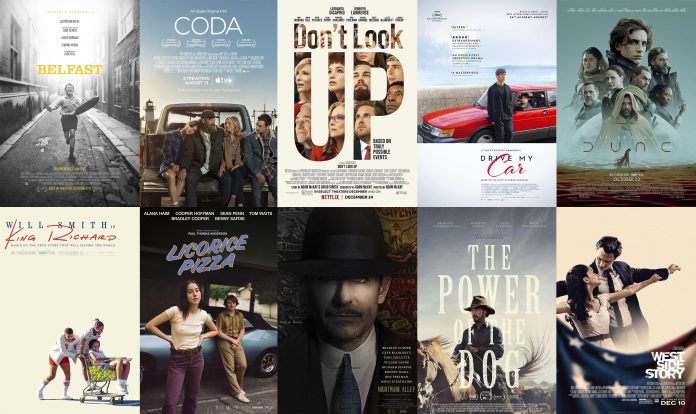In the dimly lit theater of our collective imagination, certain films flicker to life, casting shadows that stretch far beyond their frames. These are not merely movies; they are seismic events that have reshaped the landscape of cinema, redefining storytelling, technique, and cultural impact. As we journey through the annals of film history, there emerges a pantheon of must-watch masterpieces—each a bold stroke on the canvas of the seventh art, altering its course forever. From the audacious innovations of early pioneers to the revolutionary narratives of modern auteurs, these films are the keystones of cinematic evolution. They have dared to challenge conventions, provoke thought, and inspire generations, leaving an indelible mark on both celluloid and society. Join us as we delve into the stories behind these transformative works, exploring how they not only entertained but also influenced the very essence of filmmaking, cementing their status as timeless icons in the ever-evolving reel of history.
Cinematic Trailblazers: Films That Redefined Storytelling
Throughout the history of cinema, certain films have emerged as revolutionary forces, reshaping the landscape of storytelling. These films have not only captivated audiences with their compelling narratives but also redefined the very essence of filmmaking. With their groundbreaking techniques and innovative approaches, they have set new benchmarks for the industry, inspiring generations of filmmakers to push the boundaries of their craft.
- Citizen Kane (1941): Often hailed as the greatest film ever made, Orson Welles’ masterpiece introduced non-linear storytelling and deep-focus cinematography, forever altering narrative structure and visual aesthetics.
- Pulp Fiction (1994): Quentin Tarantino’s cult classic shattered conventional storytelling with its nonlinear plot and eclectic dialogue, creating a new paradigm for independent filmmaking.
- The Matrix (1999): With its groundbreaking visual effects and philosophical depth, this sci-fi epic redefined the action genre, setting a new standard for visual storytelling.
- Avatar (2009): James Cameron’s epic introduced groundbreaking 3D technology and motion capture, revolutionizing the way stories are brought to life on the big screen.
These films, among others, have not only entertained but also challenged and expanded the horizons of cinematic storytelling. Their enduring impact continues to influence filmmakers and audiences alike, solidifying their place as true trailblazers in the annals of film history.

Visual Masterpieces: How Innovative Techniques Revolutionized Filmmaking
In the world of cinema, certain films stand out not just for their storytelling but for the groundbreaking techniques that have reshaped the industry. These visual masterpieces have set new standards, inspiring countless filmmakers to push the boundaries of their craft. Here are some must-watch films that have forever altered the landscape of filmmaking:
- Citizen Kane (1941): Often heralded as the greatest film of all time, Orson Welles’ magnum opus introduced innovative techniques like deep focus and non-linear storytelling, which continue to influence directors today.
- 2001: A Space Odyssey (1968): Stanley Kubrick’s epic science fiction film is renowned for its pioneering special effects and meticulous attention to detail, setting a new benchmark for visual storytelling.
- Star Wars (1977): George Lucas revolutionized the use of special effects, creating a new era of blockbuster filmmaking with groundbreaking technology and world-building that still echoes through modern cinema.
- The Matrix (1999): Known for its iconic “bullet time” effect, this film by the Wachowskis redefined action sequences and visual effects, leaving a lasting impact on the genre.
- Avatar (2009): James Cameron’s use of advanced motion capture and 3D technology opened new horizons for immersive storytelling, setting records and changing how audiences experience film.
These films not only entertained audiences but also set new creative standards, proving that innovation is the true heart of cinematic evolution. Embrace these masterpieces to understand how they have changed the course of film history.

Cultural Catalysts: Movies That Influenced Societal Perspectives
Throughout the annals of cinematic history, certain films have transcended mere entertainment, serving as profound reflections and provocations of societal norms and beliefs. These cultural catalysts are not just movies; they are movements in themselves, challenging the status quo and reshaping public consciousness. Below is a list of influential films that have left indelible marks on society:
- “To Kill a Mockingbird” (1962): A poignant exploration of racial injustice and moral growth in the American South, this film continues to inspire conversations about equality and justice.
- “Schindler’s List” (1993): By portraying the harrowing realities of the Holocaust, this masterpiece has educated generations on the atrocities of history and the power of individual courage.
- “Brokeback Mountain” (2005): A groundbreaking narrative that challenged stereotypes and broadened the representation of LGBTQ+ relationships in mainstream media.
- “Black Panther” (2018): Not just a superhero film, but a cultural phenomenon that celebrated African heritage and provided a powerful commentary on race and identity.
Each of these films, through their compelling storytelling and bold themes, has acted as a mirror to society, reflecting its flaws and triumphs, and in turn, fostering a more inclusive and enlightened world.
Essential Viewing: Timeless Classics That Shaped the Film Industry
From the silver screen’s golden era to the transformative waves of modern cinema, certain films have etched their mark on the celluloid tapestry, redefining storytelling and technical artistry. These masterpieces transcend time, offering not just entertainment but a profound impact on filmmakers and audiences alike. The legacy of these films is an indelible testament to their influence, as they continue to inspire and shape the future of cinema.
- Citizen Kane: Often hailed as the greatest film ever made, Orson Welles’ magnum opus revolutionized narrative structure and cinematography.
- Psycho: Alfred Hitchcock’s thriller broke conventions with its innovative editing and shocking narrative twists, forever changing the suspense genre.
- The Godfather: Francis Ford Coppola’s epic tale of crime and family set a new standard for storytelling and character development.
- Star Wars: George Lucas’ space opera brought groundbreaking special effects and established the blockbuster era.
- Pulp Fiction: Quentin Tarantino’s non-linear narrative and stylized dialogue redefined independent filmmaking and pop culture.



